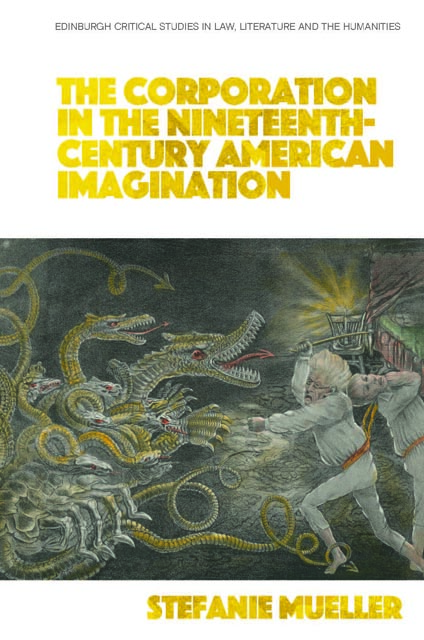Book contents
- Frontmatter
- Contents
- List of Figures
- Acknowledgments
- Introduction: The Many and the One: Corporate Bodies and the Body Politic in US Law and Culture
- 1 Narrating Monopoly and Empire: Austin, Irving, and the Charles River Bridge Case
- 2 The Soulless Corporation: Cooper and the Decline of the Republic
- 3 Satanic Corporate Agents in the Marketplace: Hawthorne, Melville, De Forest, and the Uses of Allegory
- 4 Incorporating the Nation: Ruiz de Burton and “Quasi Public” Corporations
- 5 The End of Individualism: Tarbell, Norris, and the Power of Combinations
- Conclusion: Frankenstein in a Gray Flannel Suit
- Bibliography
- Index
Introduction: The Many and the One: Corporate Bodies and the Body Politic in US Law and Culture
Published online by Cambridge University Press: 25 April 2023
- Frontmatter
- Contents
- List of Figures
- Acknowledgments
- Introduction: The Many and the One: Corporate Bodies and the Body Politic in US Law and Culture
- 1 Narrating Monopoly and Empire: Austin, Irving, and the Charles River Bridge Case
- 2 The Soulless Corporation: Cooper and the Decline of the Republic
- 3 Satanic Corporate Agents in the Marketplace: Hawthorne, Melville, De Forest, and the Uses of Allegory
- 4 Incorporating the Nation: Ruiz de Burton and “Quasi Public” Corporations
- 5 The End of Individualism: Tarbell, Norris, and the Power of Combinations
- Conclusion: Frankenstein in a Gray Flannel Suit
- Bibliography
- Index
Summary
In recent years, corporations and their role in democracies have received increasing attention not just from legal and cultural scholars but also from the public in the United States. Spectacular legal decisions, in particular Citizens United v. Federal Election Commission (2010), have contributed to this phenomenon and have raised questions about the legal status of corporations as subjects of rights and duties—in other words, as legal persons. In Citizens United, the US Supreme Court decided that corporations as legal persons are protected under the First Amendment of the Constitution and that they have the right to free speech. The ramifications of this decision raised concerns that touched the very meaning of democracy and citizenship in the United States. In the case of Citizens United, it was the idea of equal access and opportunity in the so-called “marketplace of ideas” that was deemed essential to a functioning democracy but in which corporations, by nature of their greater economic and social resources, appeared as larger-than-life actors, far more powerful than the individual citizen. In the mediation of this controversy which preceded, but mostly followed the Court’s decision, David-versus-Goliath narratives and Frankenstein tropes abounded (335). Overwhelmingly, they conveyed the popular sense that the Court was not just adding to corporate power in the US but was essentially creating non-human actors whose power actively curtailed the rights of other citizens.
The present study is not about these twenty-first-century controversies, but rather about what preceded them. To fully understand the relationship between corporate power and democracy in the United States it is necessary to take a historical approach, one that equally recognizes the role of legal, economic, and popular discourses in the development of this relationship. To that end, this study presents a literary and cultural history of the corporation in the United States in the long nineteenth century. It shows how artists, lawyers and economists, fiction and nonfiction writers represented the corporate form’s development: from its being understood as a creation of the law to a creature of the market. While the study proceeds chronologically—from the debates over banking corporations during the revolutionary period and their culmination in Andrew Jackson’s Bank War in the 1830s, to the rise of large industrial corporations and the triumph of separate legal personhood in the 1930s—it also shows that this development from political to economic instrument was not inevitable, nor did it go unchallenged.
- Type
- Chapter
- Information
- Publisher: Edinburgh University PressPrint publication year: 2022



